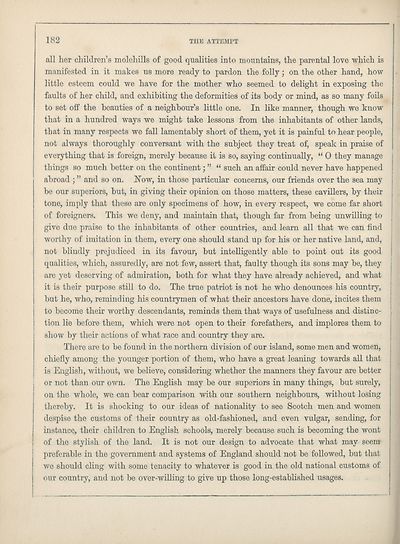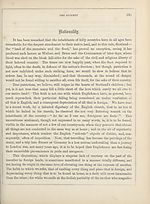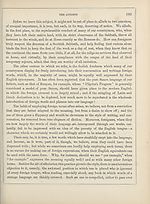Attempt > Volume 1 and Select writings
(194) Page 182
Download files
Complete book:
Individual page:
Thumbnail gallery: Grid view | List view

182 THE ATTEMPT
all her children’s molehills of good qualities into mountains, the parental love which is
manifested in it makes us more ready to pardon the folly; on the other hand, how
little esteem could we have for the mother who seemed to delight in exposing the
faults of her child, and exhibiting the deformities of its body or mind, as so many foils
to set olf the beauties of a neighbour’s little one. In like manner, though we know
that in a hundred ways we might take lessons from the inhabitants of other lands,
that in many respects we fall lamentably short of them, yet it is painful to hear people,
not always thoroughly conversant with the subject they treat of, speak in praise of
everything that is foreign, merely because it is so, saying continually, “ 0 they manage
things so much better on the continent; ” “ such an affair could never have happened
abroad ; ” and so on. How, in those particular concerns, our friends over the sea may
be our superiors, but, in giving their opinion on those matters, these cavillers, by their
tone, imply that these are only specimens of how, in every respect, we come far short
of foreigners. This we deny, and maintain that, though far from being unwilling to
give due praise to the inhabitants of other countries, and learn all that we can find
worthy of imitation in them, every one should stand up for his or her native land, and,
not blindly prejudiced in its favour, but intelligently able to point out its good
qualities, which, assuredly, are not few, assert that, faulty though its sons may be, they
are yet deserving of admiration, both for what they have already achieved, and what
it is their purpose still to do. The true patriot is not he who denounces his country,
but he, who, reminding his countrymen of what their ancestors have done, incites them
to become their worthy descendants, reminds them that ways of usefulness and distinc¬
tion lie before them, which were not open to their forefathers, and implores them to
show by their actions of what race and country they are.
There are to be found in the northern division of our island, some men and women,
chiefly among the younger portion of them, who have a great leaning towards all that
is English, without, we believe, considering whether the manners they favour are better
or not than our own. The English may be our superiors in many things, but surely,
on the whole, we can bear comparison with our southern neighbours, without losing
thereby. It is shocking to our ideas of nationality to see Scotch men and women
despise the customs of their country as old-fashioned, and even vulgar, sending, for
instance, their children to English schools, merely because such is becoming the wont
of the stylish of the land. It is not our design to advocate that what may seem
preferable in the government and systems of England should not be followed, but that
we should cling with some tenacity to whatever is good in the old national customs of
our country, and not be over-willing to give up those long-established usages.
all her children’s molehills of good qualities into mountains, the parental love which is
manifested in it makes us more ready to pardon the folly; on the other hand, how
little esteem could we have for the mother who seemed to delight in exposing the
faults of her child, and exhibiting the deformities of its body or mind, as so many foils
to set olf the beauties of a neighbour’s little one. In like manner, though we know
that in a hundred ways we might take lessons from the inhabitants of other lands,
that in many respects we fall lamentably short of them, yet it is painful to hear people,
not always thoroughly conversant with the subject they treat of, speak in praise of
everything that is foreign, merely because it is so, saying continually, “ 0 they manage
things so much better on the continent; ” “ such an affair could never have happened
abroad ; ” and so on. How, in those particular concerns, our friends over the sea may
be our superiors, but, in giving their opinion on those matters, these cavillers, by their
tone, imply that these are only specimens of how, in every respect, we come far short
of foreigners. This we deny, and maintain that, though far from being unwilling to
give due praise to the inhabitants of other countries, and learn all that we can find
worthy of imitation in them, every one should stand up for his or her native land, and,
not blindly prejudiced in its favour, but intelligently able to point out its good
qualities, which, assuredly, are not few, assert that, faulty though its sons may be, they
are yet deserving of admiration, both for what they have already achieved, and what
it is their purpose still to do. The true patriot is not he who denounces his country,
but he, who, reminding his countrymen of what their ancestors have done, incites them
to become their worthy descendants, reminds them that ways of usefulness and distinc¬
tion lie before them, which were not open to their forefathers, and implores them to
show by their actions of what race and country they are.
There are to be found in the northern division of our island, some men and women,
chiefly among the younger portion of them, who have a great leaning towards all that
is English, without, we believe, considering whether the manners they favour are better
or not than our own. The English may be our superiors in many things, but surely,
on the whole, we can bear comparison with our southern neighbours, without losing
thereby. It is shocking to our ideas of nationality to see Scotch men and women
despise the customs of their country as old-fashioned, and even vulgar, sending, for
instance, their children to English schools, merely because such is becoming the wont
of the stylish of the land. It is not our design to advocate that what may seem
preferable in the government and systems of England should not be followed, but that
we should cling with some tenacity to whatever is good in the old national customs of
our country, and not be over-willing to give up those long-established usages.
Set display mode to: Large image | Transcription
Images and transcriptions on this page, including medium image downloads, may be used under the Creative Commons Attribution 4.0 International Licence unless otherwise stated. ![]()
| Ladies' Edinburgh Debating Society publications > Attempt > Volume 1 and Select writings > (194) Page 182 |
|---|
| Permanent URL | https://digital.nls.uk/109867282 |
|---|
| Attribution and copyright: |
|
|---|

